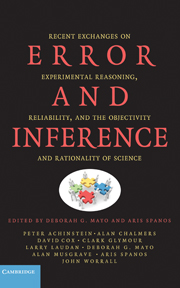 Error and Inference
Error and Inference Book contents
- Frontmatter
- Contents
- List of Contributors
- Preface
- Introduction and Background
- 1 Learning from Error, Severe Testing, and the Growth of Theoretical Knowledge
- 2 The Life of Theory in the New Experimentalism
- 3 Revisiting Critical Rationalism
- 4 Theory Confirmation and Novel Evidence
- 5 Induction and Severe Testing
- 6 Theory Testing in Economics and the Error-Statistical Perspective
- 7 New Perspectives on (Some Old) Problems of Frequentist Statistics
- 8 Causal Modeling, Explanation and Severe Testing
- 9 Error and Legal Epistemology
- Index
- References
1 - Learning from Error, Severe Testing, and the Growth of Theoretical Knowledge
Published online by Cambridge University Press: 29 January 2010
- Frontmatter
- Contents
- List of Contributors
- Preface
- Introduction and Background
- 1 Learning from Error, Severe Testing, and the Growth of Theoretical Knowledge
- 2 The Life of Theory in the New Experimentalism
- 3 Revisiting Critical Rationalism
- 4 Theory Confirmation and Novel Evidence
- 5 Induction and Severe Testing
- 6 Theory Testing in Economics and the Error-Statistical Perspective
- 7 New Perspectives on (Some Old) Problems of Frequentist Statistics
- 8 Causal Modeling, Explanation and Severe Testing
- 9 Error and Legal Epistemology
- Index
- References
Summary
I regard it as an outstanding and pressing problem in the philosophy of the natural sciences to augment the insights of the new experimentalists with a correspondingly updated account of the role or roles of theory in the experimental sciences, substantiated by detailed case studies.
(Chalmers, 1999, p. 251)Background to the Discussion
The goal of this chapter is to take up the aforementioned challenge as it is posed by Alan Chalmers (1999, 2002), John Earman (1992), Larry Laudan (1997), and other philosophers of science. It may be seen as a first step in taking up some unfinished business noted a decade ago: “How far experimental knowledge can take us in understanding theoretical entities and processes is not something that should be decided before exploring this approach much further” (Mayo, 1996, p. 13). We begin with a sketch of the resources and limitations of the “new experimentalist” philosophy.
Learning from evidence, in this experimentalist philosophy, depends not on appraising large-scale theories but on local experimental tasks of estimating backgrounds, modeling data, distinguishing experimental effects, and discriminating signals from noise. The growth of knowledge has not to do with replacing or confirming or probabilifying or “rationally accepting” large-scale theories, but with testing specific hypotheses in such a way that there is a good chance of learning something – whatever theory it winds up as part of.
- Type
- Chapter
- Information
- Error and InferenceRecent Exchanges on Experimental Reasoning, Reliability, and the Objectivity and Rationality of Science, pp. 28 - 57Publisher: Cambridge University PressPrint publication year: 2009
References
- 23
- Cited by
